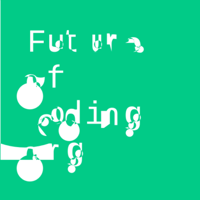
Future of Coding Podcast
1) The Computer is a Feeling by Tim Hwang & Omar Rizwan
We've renamed the podcast and community — we are now the Feeling of Computing! Here are some thoughts about the motivation to rename and the choice of new name. It's a small change, but it ...Show More
2) Let's Take Esoteric Programming Languages Seriously
One of the biggest goals of this show — our raisin detour, if you will — is to encourage people to look at computer programming differently. It's not just a job, or a way to make the compu...Show More
3) As We May Think by Vannevar Bush
A classic "80-year predictions" episode. How did we do, humanity? Links $ Patreon We're considering changing The Name of the FoC community, podcast, et cetera. Transatlantic Accent, and all the ships...Show More
4) Computing Machinery and Intelligence by Alan Turing (feat. Felienne Hermans)
You know Alan Turing, right? And the Turing test? Have you actually read the paper that introduced it, Computing Machinery and Intelligence? No?! You… you are not prepared. With very special g...Show More
Computing Machinery and Intelligence by Alan Turing (feat. Felienne Hermans)
2:11:38 | Apr 27th, 2025
5) A Case for Feminism in Programming Language Design by Felienne Hermans
In the academic field of programming language research, there are a few prestigious conferences that you must present at to advance in your career. These conferences are rather selective about which p...Show More
6) Is the Whole Universe a Computer™?
"Is the whole universe a computer?", ask Jack Copeland, Mark Sprevak, and Oron Shagrir in chapter 41 of the book The Turing Guide. They split this question in two, first asking whether the universe it...Show More
7) Moving Beyond Syntax: Lessons from 20 Years of Blocks Programming in AgentSheets by Alexander Repenning
Alexander Repenning created AgentSheets, an environment to help kids develop computational thinking skills. It wrapped an unusual computational model with an even more unusual user interface. The resu...Show More
8) Pygmalion by David C. Smith
If you're anything like Ivan (oof, sorry), you've heard of Pygmalion but never caught more than the gist. Some sort of project from the early 70s, similar to Sketchpad or Smalltalk or something, yet a...Show More
9) Elephant in the Room
Inventing on PrincipleStop Drawing Dead FishThe Future of Programming Yes, all three of them in one episode. Phew! Links $ patreon.com/futureofcoding — Lu and Jimmy recorded an episode about Hest w...Show More
10) Beyond Efficiency by Dave Ackley
Dave Ackley's paper Beyond Efficiency is three pages long. With just these three pages, he mounts a compelling argument against the conventional way we engineer software. Instead of inflexibly insisti...Show More